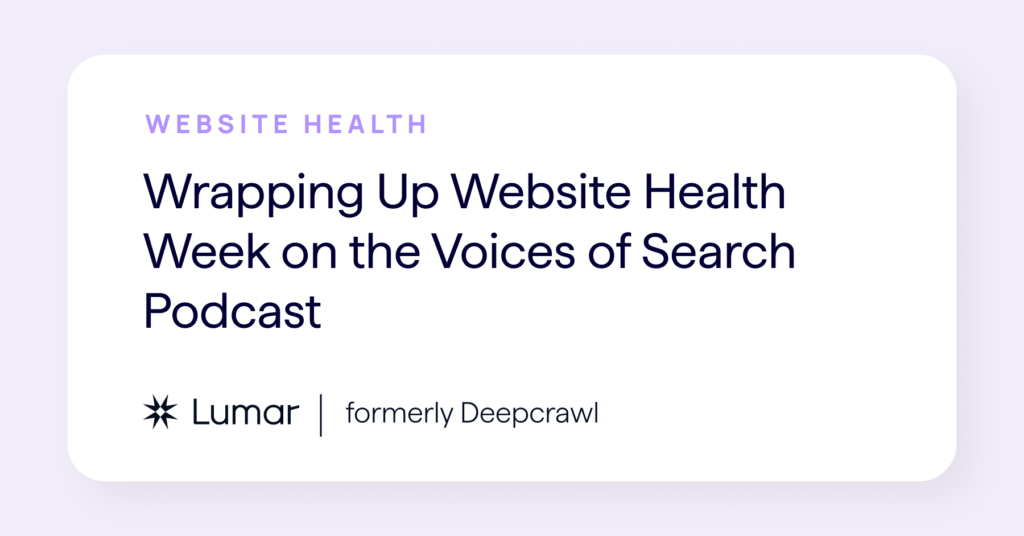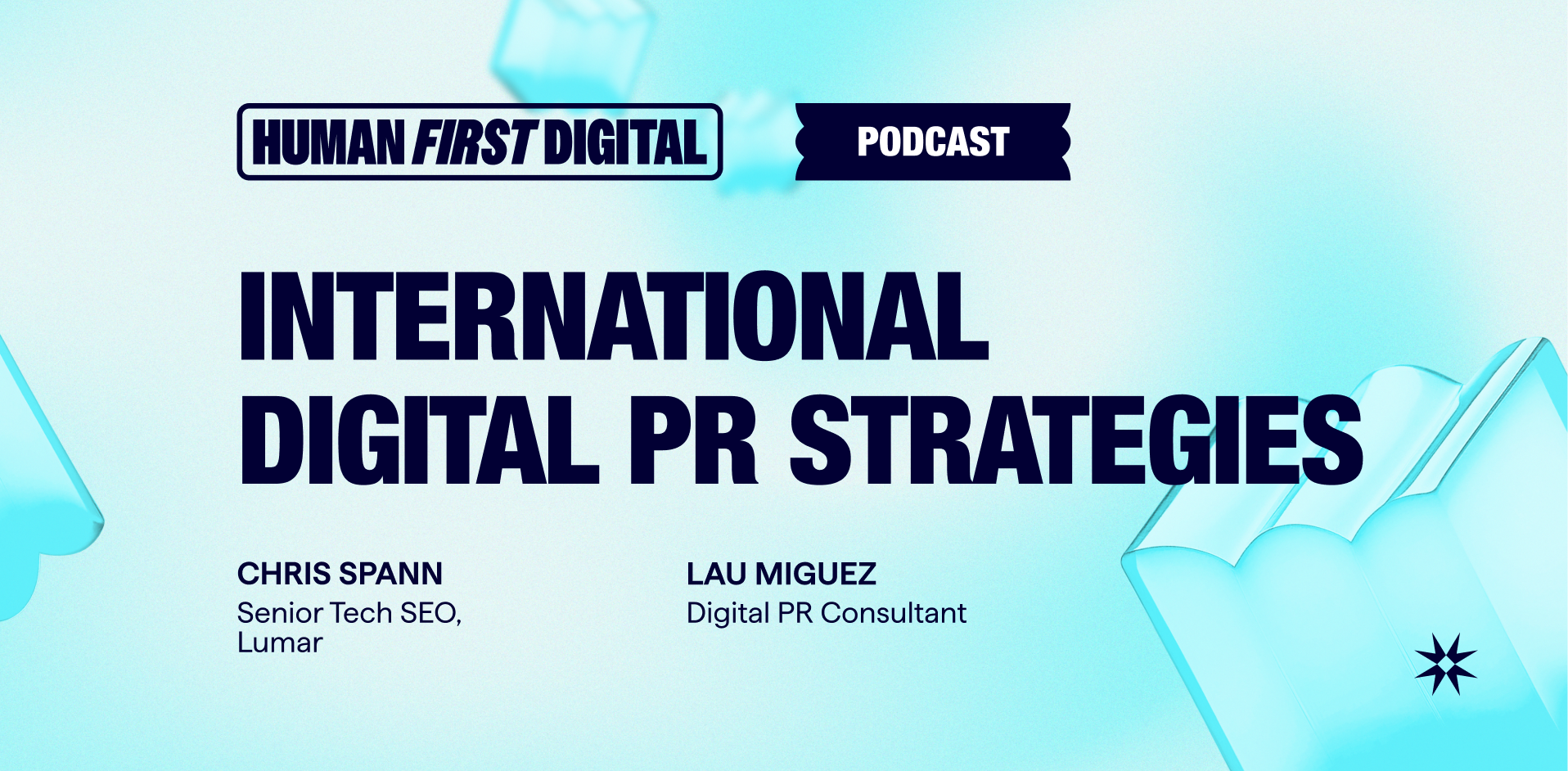Each day this week, Ashley Berman Hale, Deepcrawl’s Vice President of Professional Services, joined podcast host Benjamin Shapiro on the Voices of Search podcast for a 5-episode series on Website Health. Their far-ranging conversations cover everything from why website health matters and explaining each step in the SEO Funnel, to exactly which resources are needed to maintain a healthy website, how to manage website health at an enterprise scale, and how to save time with website health automations.
Check out the full week of episodes and read our top takeaways from Benjamin and Ashley’s conversions below.
To learn more about the various factors that contribute to your website’s health and help ensure a high-performing, search-visible, and user-friendly experience, check out our Website Health blog series.
Part 1: The Importance of Website Health
Ashley uses a metaphor of an art gallery to help explain the concept of website health as a foundational aspect of ensuring your website will succeed, both in terms of organic traffic and in terms of user experience. If you’re building an art gallery and want to show your masterpieces to the public, first you need to ask yourself:
“Have I built on a stable foundation? Do I have the right infrastructure to support great lighting throughout, environmental controls, plumbing, et cetera? All of this encompasses what you really need to have in place before you open the doors and allow people to come in. It all starts with how it’s built.”
Similar to the art gallery example, you may have great content on your website that you’d love users to see, but ensuring your site visitors have a great experience — and ensuring they can find your site in search engine results — first requires getting the foundations of your website right. Technical SEO is a major part of your website’s overall health and it matters for both users and search engines alike.
But website health is important for more than just technical SEO and development teams. For marketing teams, website health is a performance multiplier — it helps boost their messaging, build brand awareness, create better customer experiences, and ultimately, helps drive revenue. For product teams, particularly those whose website is their product, technical SEO helps get their product in the hands of more people. Product teams can work hand-in-hand with technical SEO teams to share data, strategize optimizations, and build a better user experience. For sales teams, technical SEO helps bring in leads by driving website traffic and creating faster, smoother page experiences that support conversion rates and help drive revenue.
Listen to the full episode here:
Part 2: The SEO Funnel & Website Health
Ashley and Benjamin discuss the “SEO Funnel” and how each stage of the funnel contributes to overall website health. A lot of sales and marketing teams work on funnel frameworks — visualizing the different aspects of their teams’ work as “top of funnel” (TOFU), “middle of funnel” (MOFU), or “bottom of funnel” (BOFU) — all driving toward an end goal of conversions and revenue.
SEO can similarly be visualized as a funnel — one that drives toward achieving optimal website health (which, in itself, helps drive conversions and revenue!). Ashley walks through the 7-stage SEO funnel in this episode, moving from the foundational step of Website Architecture, through HTTP Availability, Indexability, Crawlability, Topical Authority, Content, and Experience.
Listen to the full episode here:
Part 3: Required Resources to Maintain Website Health
The third episode in Website Health week on Voices of Search focused on what resources are needed to maintain website health. What tools should be in your tech stack to support the SEO activities required to establish a high-performing site? Ashley and Benjamin go over 3 buckets of tools needed in your tech stack to support website health:
- Technical Website Health Tools: Invest in a great technical analytics platform with advanced crawling technology that can provide you with robust, in-depth data and insights into the technical structure of your website. (Ashley points out that, for enterprise companies, it’s particularly important to enlist an analytics tool that can perform at scale and handle crawling across a large volume of URLs.)
- Traffic Insight Tools: Get a strong understanding of how your site is driving traffic from search engines with search engine tools like Google Search Console.
- Content Tools: On the content-and-keywords side of SEO, look for keyword analytics platforms that can help your teams understand how content is performing and what you should be building and writing next.
They also discuss how important human resources are in getting website health right — often, when seeking to improve your website’s health and organic search performance, this requires internal education efforts across various departments and knowing how to show the value of SEO to leadership so that they understand the full impact of this work. A lot of operational aspects also need to be considered to ensure your teams are collaborating well across the multiple departments that contribute to your website — aligning SEOs, marketers, content producers, and developers with shared access to crawl data, website insights, and automation tools can go a long way toward enabling better collaboration and stronger execution of website health strategies.
Get the detailed tips on which platforms and solutions might be right for you in the full episode here:
Part 4: Website Health at Enterprise Scale
In this episode, Ashley and Benjamin talk about the particular challenges of maintaining website health for large enterprise websites — sites that often have hundreds of thousands (if not millions) of URLs.
“Tools are really important, but for me, I would lean on tools that offer you data — transparent data, sitewide. Ultimately, you’re going to need tools that allow your best people to do their best work,” said Ashley. You need to have insights into trends happening across your site and be able to identify the things that you can change at scale. Benjamin points out that, for extra-large sites, “you cannot rely on intuition.” With thousands of category pages and super complex linking, you need to have access to the right data.
With enterprise sites, you have a lot of cooks in the kitchen. Usually, a large number of people have touched enterprise sites over time, and there can be many legacy components of a site that work unexpectedly or end up causing issues down the road. You need platforms that can cope with crawling hundreds of thousands or millions of pages and that present the large-scale data to your team in a clear way. You also need to be able to share this data with multiple stakeholders within the enterprise business — and communicate it clearly to leadership teams who may not be as technically informed. Being able to make data meaningful and get the right data sets that matter to individual teams helps to ensure you have the buy-in needed from each department. It’s also worth having specialization within your team on large sites — managing website health at scale is not a one-person job, so once again, having the correct resources to hand is an integral part of successfully establishing website health at scale. Ashley also points out that enterprise companies cannot rest on their laurels and brand recognition when it comes to website health and organic search — for long-tail keywords, which can be quite valuable for sales and traffic, a brand name will only take you so far; often enterprise companies will find themselves competing with much smaller companies in the SERPs.
Hear the full conversation here:
Part 5: Automating Website Health
Wrapping up Website Health Week on the Voices of Search podcast, Ashley and Benjamin discuss how to improve efficiencies with website health automation. Taking a technical SEO perspective, they discuss several ways to implement time-saving automations within your website health efforts.
Ashley recommends running automated SEO tests in the staging environment to take a more proactive rather than reactive approach to website health. She points out that fixing broken code in a live environment takes longer and is often more expensive than preventing that poorly performing code from going live in the first place. Implementing SEO-focused tests at the QA stage can also help align developer teams with SEO and digital marketing teams — and save headaches from occurring later on. (Note: Deepcrawl’s Automation Hub is an excellent choice for automated testing, and we don’t just say so ourselves…)
Having automated alerts from your website health platform in place can also help ensure fast action to fix any problems that do end up being introduced to your website.
Get the details on further website health automation options in the full episode:
Want more from Voices of Search? Check out their full archive of Voices of Search podcast episodes.
Want more from Deepcrawl’s Ashley Berman Hale? Connect with our Professional Services team anytime!





